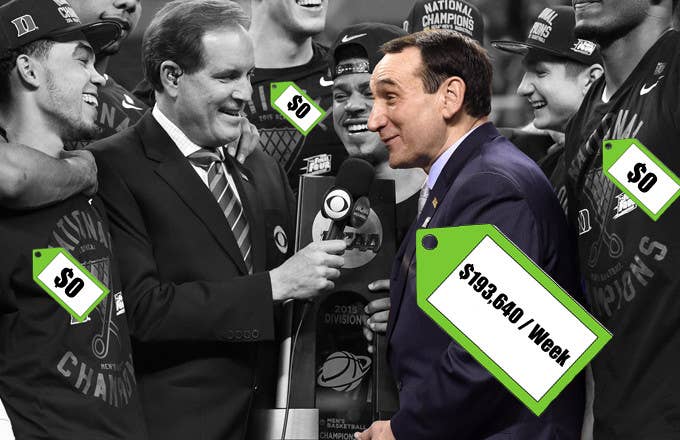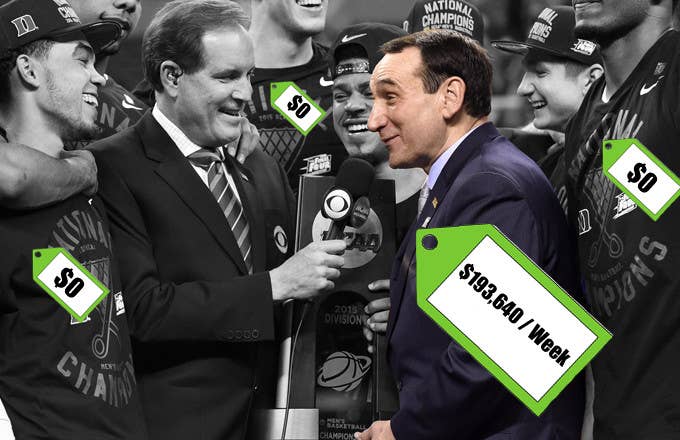
If you wanted to attend the 2015 NCAA Men's Final Four in Indianapolis this past April (and didn't have any connections), according to CBS Detroit and TiqIQ you would've had to fork over $1,151.98. Per ticket. To sit among a Lucas Oil Stadium record-breaking crowd of 143,387.
The semifinals—broadcast exclusively through Turner Sports' family of networks including TBS, TNT, and truTV—grossed 16.4 million viewers total. Kentucky versus Wisconsin became the most-viewed college basketball game of all time on a cable network.
1.

The championship game was viewed on CBS by a ridiculous 27 million people. The game was also broadcast internationally through ESPN to 170 countries. CBS Sports and Turner Broadcasting alone paid more than $10.8 billion to the NCAA back in 2010 for 14 years of rights to do this, which makes sense considering CBS and Turner sold $1.13 billion in ads during the 2015 tournament alone. The head coaches of the teams in the championship game, Mike Krzyzewski of Duke and Bo Ryan of Wisconsin, made a combined salary of $12,628,032 this year.
But this is amateur basketball, and regardless how many billions of dollars are passed around between the NCAA, its broadcast partners, and various sponsoring corporations, the players themselves still make zero. They're in a money wind machine but locked in a straight jacket.
Somehow this doesn't seem right.
Lucky for me this summer I was able to sit down with Jay Bilas, ESPN college basketball analyst, former college basketball player for Duke, attorney, Jeezy fan, and renowned supporter of college basketball compensation reform. I asked Mr. Bilas to explain in simple terms why college athletes deserve to be paid. This is what he told me.
2. It’s a multi-billion dollar business where the only people who are restricted in their earnings, in any way, are the athletes.

3. Nobody would put up with this in any other walk of life.

"First of all, people will say, 'What’s next? Do you want to pay high school players next?' High school sports do not make billions of dollars. They are not marketing it as a professional sports as college sports is. I mean, it's pro sports in every way, except for the players.
"Look at it this way—child actors get paid. If the studios decided, together—if they colluded together—'Look, we aren’t going to pay these kids anymore. What we will do is we will give them their expenses and really nice accommodations on set. We will give them tutors and we will make it a good experience for them. But, we all agree we are not going to pay them anymore.'
"And so, for example, if your kid is the star of Home Alone, and they say 'Look, we are just going to pay for expenses. And if they do a really good job, maybe when they're older and they become an adult they can get paid then.' You would say, “No, no—this is not the school play. This is a multi-billion dollar business. Billions of dollars are being made and my kid is the star of the show. That’s not right. This is a commercial enterprise.'
Think about what the scholarship is...it’s the school paying itself. It’s like me paying myself for rent for my kids in my house. And then claiming I don’t have any money left because I paid myself rent for them.
"Well, college sports is a commercial enterprise. If they ran it the way Division III runs it, like Williams College or Amherst, where they don’t charge admission [it might not be a commercial enterprise]. The NCAA does not charge admission for tournaments in Division II and Division III. They charge in Division I. They charge big money. And they sell it, they sell it to television.
"I think it's actually immoral to restrict only one class of person from benefiting to their level of worth. Because it’s not like they're saying to the coaches, 'One hundred thousand dollars is enough for you guys.' They are making millions of millions of dollars. You have assistant coaches making millions of dollars now! And then you have the players that have been these 'amateurs' forever.
"Do you know what amateurism is? It’s whatever the NCAA says it is. So it can mean whatever they define at a given time. And the definition has changed over the year. And it's changing again, a little bit, because they’ve run into trouble legally. But, fundamentally it’s just one of these things that aren’t right. Maybe it was okay when the money was within the bounds of reason. But it’s not in the bounds of reason anymore.
"Licensing—I mean it goes on forever. And they set up a structure that makes it look like they don’t make any money. It’s like the NBA saying, 'You know, we don’t make any money. So the players should make less.' The players get 50% of basketball-related revenue. They don’t get anything in college.
"When they talk about all of the expenses. Think about what the scholarship is. The scholarship is a dollar amount that is transferred from the athletic department to the school. So it’s the school paying itself. It’s like me paying myself for rent for my kids in my house. And then claiming I don’t have any money left because I paid myself rent for them.
"That doesn’t make any sense."
4. "It'll ruin the game" doomsday scenarios are ridiculous.

5. Other sports will not be canceled because some players are being paid.

6. Implementing a new system is much easier than those in charge want you to believe.

"It would be really orderly and easy. It wouldn’t be that hard. Players would sign contracts, they’d be bound by those contracts. They’d perform per the terms of the contracts, as would the school.
"The complication of [a new system], those in charge are using it as a barrier of change. They’re saying, 'It’s too complicated, we can’t figure it out.' But boy, they can put together a college football playoff in two seconds and make a billion dollars.
They’re saying, 'It’s too complicated, we can’t figure it out.' But boy, they can put together a college football playoff in two seconds and make a billion dollars.
"All they need to do is say it’s an open system, you can pay what you like. The other rules: You’ve got four years of eligibility, you can play those four in five. You have to remain in good standing as a full-time student in your institution. You have to qualify academically the same way in order to be able to play. And then if I’m recruiting you—like if State U comes after you and says, 'We think you can be a great player for us. We will offer you a three year contract—$100,000 a year plus room, board, and books. A condition of the contract is you will have to remain in good academic standing all times. If you fall out of academic standing we have a right to terminate the contract. If you get arrested, or charged with a crime/misdemeanor we can terminate the contract. If you decide to leave, you can’t play anywhere else for a year. Can’t play the pros, can’t play in college. You can’t go and compete against us because we’ve made an investment in you. We can’t force you to play here but we can keep you from playing somewhere else.'
"And then your side would say, 'I think I’m good enough to leave in two years. So, I’ll take a two-year contract—even though it would probably be for less money—but I want the opportunity to leave or renegotiate after two years. On the grades, I want independent verification of my grades. I want to be independently audited so if I play crappy and then all of a sudden my grades magically slip and I flunk out, then I’m all of a sudden ineligible—I need independent verification for that. And I’m not going to have my contract reliant upon some false arrest so if I’m convicted of a crime, I’ll agree to that. But if I’m just arrested on something, then no.'
"You would negotiate it out, the way anyone else would. It’s easy, it’s not that hard. The rest of the world is able to operate in the free market, and college athletics—just the players, that is—can’t?"
7. It won't dramatically change the quality of the top teams.

8. Good players would stay in school longer.


